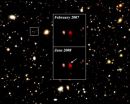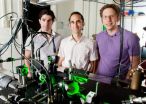(Press-News.org) A new study presents the first evidence that a basic sense of fairness and altruism appears in infancy. Babies as young as 15 months perceived the difference between equal and unequal distribution of food, and their awareness of equal rations was linked to their willingness to share a toy.
"Our findings show that these norms of fairness and altruism are more rapidly acquired than we thought," said Jessica Sommerville, a University of Washington associate professor of psychology who led the study.
"These results also show a connection between fairness and altruism in infants, such that babies who were more sensitive to the fair distribution of food were also more likely to share their preferred toy," she said.
The study has implications for nurturing human egalitarianism and cooperation. The journal PLoS ONE published the findings online Oct. 7, 2011. Co-author is Marco Schmidt, a doctoral student at the Max Planck Institute for Evolutionary Anthropology.
Previous studies reveal that 2-year-old children can help others – considered a measure of altruism – and that around age 6 or 7 they display a sense of fairness. Sommerville, an expert in early childhood development, suspected that these qualities could be apparent at even younger ages.
Babies around 15 months old begin to show cooperative behaviors, such as spontaneously helping others. "We suspected that fairness and altruism might also be apparent then, which could indicate the earliest emergence of fairness," Sommerville said.
During the experiment, a 15-month old baby sat on his or her parent's lap and watched two short videos of experimenters acting out a sharing task. In one video an experimenter holding a bowl of crackers distributed the food between two other experimenters. They did the food allocation twice, once with an equal allotment of crackers and the other with one recipient getting more crackers.
The second movie had the same plot, but the experimenters used a pitcher of milk instead of crackers.
Then the experimenters measured as the babies – 47 in all who were tested individually – looked at the food distributions. According to a phenomenon called "violation of expectancy," babies pay more attention when they are surprised. Similarly, the researchers found that babies spent more time looking if one recipient got more food than the other.
"The infants expected an equal and fair distribution of food, and they were surprised to see one person given more crackers or milk than the other," Sommerville said.
To see if the babies' sense of fairness related to their own willingness to share, the researchers did a second task in which a baby could choose between two toys: a simple LEGO block or a more elaborate LEGO doll. Whichever toy the babies chose, the researchers labeled as the infant's preferred toy.
Then an experimenter who the babies had not seen before gestured toward the toys and asked, "Can I have one?" In response, one third of the infants shared their preferred toy and another third shared their non-preferred toy. The other third of infants did not share either toy, which might be because they were nervous around a stranger or were unmotivated to share.
"The results of the sharing experiment show that early in life there are individual differences in altruism," Sommerville said.
Comparing the toy-sharing task and the food-distribution task results, the researchers found that 92 percent of the babies who shared their preferred toy – called "altruistic sharers" – spent more time looking at the unequal distributions of food. In contrast, 86 percent of the babies who shared their less-preferred toy, the "selfish sharers," were more surprised, and paid more attention, when there was a fair division of food.
"The altruistic sharers were really sensitive to the violation of fairness in the food task," Sommerville said. Meanwhile, the selfish sharers showed an almost opposite effect, she said.
Does this mean that fairness and altruism are due to nature, or can these qualities be nurtured? Sommerville's research team is investigating this question now, looking at how parents' values and beliefs alter an infant's development.
"It's likely that infants pick up on these norms in a nonverbal way, by observing how people treat each other," Sommerville said.
###
The National Institute of Child Health and Human Development funded the study.
For more information, contact Sommerville at 206-616-3090 or sommej@uw.edu.
END
The largest survey to date of distant exploding stars is giving astronomers new clues to what's behind the Type Ia supernovae they use to measure distances across the cosmos.
These stellar explosions helped astronomers conclude more than a decade ago that dark energy is accelerating the expansion of the universe, and this week earned the discoverers -- including UC Berkeley physicist Saul Perlmutter -- the 2011 Nobel Prize in Physics. But what caused them was a mystery. Many astronomers thought white dwarf stars were pulling matter from their normal stellar companions ...
Research sometimes means looking for one thing and finding another. Such was the case when biology professor Alice Gibb and her research team at Northern Arizona University witnessed a small amphibious fish, the mangrove rivulus, jump with apparent skill and purpose out of a small net and back into the water.
This was no random flop, like you might see from a trout that's just been landed. The rivulus seemed to know what it was doing.
They hadn't expected to see that behavior, even from a fish known to spend time out of the water. So before long, what began as a study ...
The creators of Economic Gateway and Economic GateKeeper have partnered with Mark Lautman to provide local community leaders and economic developers a forum to discuss new ways to think about, plan, and measure economic development.
Golden Shovel is known for helping communities improve their online economic development presence with social media and professional websites, and Mark Lautman is at the forefront of helping communities change their economic development paradigm. Together, Golden Shovel and Mark Lautman, will host a series of webinars designed to help community ...
Results of a study by a group of University of Notre Dame researchers represent a promising step on the road to developing new drugs for a variety of neurological diseases.
The group from the University's Departments of Chemistry and Biochemistry and Biological Sciences and the Friemann Life Sciences Center focused on the design, synthesis and evaluation of water-soluble "gelatinase inhibitor" compounds.
Gelatinases, a class of enzymes, have been implicated in a host of human diseases from cancer to cardiovascular conditions and in particular neurological conditions ...
CHAMPAIGN, Ill. -- University of Illinois physicists have experimentally demonstrated for the first time how three-dimensional conduction is affected by the defects that plague materials. Understanding these effects is important for many electronics applications.
Led by physics professor Brian DeMarco, the researchers achieved complete localization of quantum matter waves in three dimensions, first theorized roughly half a century ago. The group published its findings in the Oct. 7 issue of the journal Science.
Defects in materials are inevitable, but their effects ...
Viaden Gaming Ltd., one of the premier online casino software developers announced the updated online casino release with feature-rich functionality, new payment options and multiple usability improvements. Here are the major updates that are pushed live with the new version:
Featured Games
To enable the operators to promote the hottest and newest games, the recent online casino solution involves the 'Featured Games' option. From now on the players visiting the web-site will have the opportunity to quickly access the games recommended by the casino.
User Analytics ...
You already know what we're going to say. We're Social Security Disability lawyers. Our clients, New Yorkers from the Finger Lakes region and elsewhere throughout the state, know who we are.
And not a single one of them is lazy.
Not a single one of them would call their disability benefits a welfare check.
Not a single one of them would consider what they have already earned to be an "entitlement."
Earned Wages in Exchange for Labor
The state of New York subscribes to "at-will" employment, as do most (if not all) states, which means ...
Cold Spring Harbor, N.Y. – In order for cells of different types to maintain their identities even after repeated rounds of cell division, each cell must "remember" which genes were active before division and pass along that memory to its daughter cells. Cells deal with this challenge by deploying a "bookmarking" process. In the same way a sticky note marks the last-read page in a book, certain molecules tag the active genes in a cell so that, after it divides, the same genes are reactivated right away in the new cells.
"What we didn't know, however, was how bookmarking ...
Research which claims to show that the introduction of patient choice in the NHS reduced deaths from heart attacks is flawed and misleading, according to a report* published in The Lancet today (Monday).
The original study was used by the Government to advance its controversial Health and Social Care Bill 2011 and was the basis for the Prime Minister's statement that 'competition is one way we can make things work better for patients'.
In today's report, academics - led by Professor Allyson Pollock of Queen Mary, University of London - point out a series of errors in ...
Rodriguez MD, a Lawrenceville clinic and bilingual Lawrenceville family practice in Gwinnett County, GA, opened an onsite Center for Medical Weight Loss on Monday October 3, 2011. Striving to help patients safely and effectively lose weight, Rodriguez MD now offers comprehensive, personalized weight loss programs. This includes:
- Body composition analysis
- Doctor-supervised food plans
- Metabolism regulation
- Appetite management
- Lifestyle and motivational coaching
- Science-based activity recommendations
Medical weight loss is physician-directed weight ...



